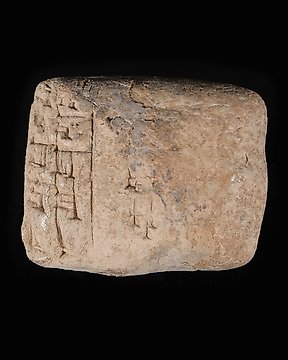
Antico babilonese Argilla Tavoletta cuneiforme (Senza Prezzo di Riserva)
N. 84442643

N. 84442643

A fine cylinder seal from the Jemdet Nasr period bearing a stylised depiction of three seated figures. The seal itself is short and tubular and features a perforation through the centre. The engraving largely consists of dots, some overlapping in areas to form figures and separate in others to imply heads or add decoration, and incised lines adding limbs, setting and dimension. The brick-coloured stone also features light striations throughout.
Seals were often made of stone however there are also examples rendered in bone, ivory, faience, glass, metal, wood, and even sun-dried or baked clay. In the ancient world, seals guaranteed the authenticity of marked ownership – as such, they were instrumental in legal transactions, and in the protection of goods against theft. Seal amulets with stylised animals have been found throughout Mesopotamia in contexts dating to the late fourth millennium BC, although stamp seals and cylinder seals were the predominant types in the ancient Near East.
The Jemdet Nasr period arose at the turn of the 3rd millenium BC, and takes its name from a Tell in Southern Mesopotamoia at which an abundance of archaeological material was discovered. This material was stylistically unique both from the material culture of the Uruk period that preceded it and contained the first finalised version of the cuneiform script, making it a pivotal period in the development of early civilisation.
Measurements: H1.9 x W1.9
Provenance: From Ex. Cotswold collection 1980. A large part of the collection was sold by a Cirencester Auction in November 2018.
Come fare acquisti su Catawiki
1. Scopri oggetti speciali
2. Fai l’offerta più alta
3. Paga in tutta sicurezza